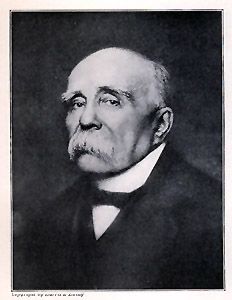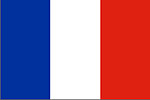![]()
This page is under construction.
Georges Clemenceau (28 September 1841 - 24 November 1929), sometimes fondly called "le Tigre" (The Tiger) by both friend and enemy alike, was already pretty old when World War I began. Clemenceau was from the Vendée, which had a history of radical politics in France, and when his early career as a journalist landed him in imminent danger of arrest by the government, he fled to the United States where he taught French and married one of his students--years later, after his return to France, he divorced and deported his wife. When the French Third Empire collapsed in 1871 as a result of the defeat in the war with Germany, Clemenceau was able to return to France to resume his journalistic career (first with the newspaper La Justice). He also embarked on a long political career as a Radical on the left-wing of French politics.
When Clemenceau was not returned to the French Assembly in 1893, he resumed full-time work as a journalist. L’affaire Dreyfus (the Dreyfus Affair) scandal returned him to political prominence. In the Dreyfus Affair, Captain Alfred Dreyfus, of Jewish origin from the province of Alsace, was accused of selling French military plans to the Germans. Even when the real culprit was discovered, the French military and government refused to clear the name of Dreyfus. It became a giant cover-up on the part of the government and army with nationalistic and anti-semitic overtones, and the Affair turned into a huge political scandal.
On 13 January 1898 Clemenceau published Émile Zola's "J'accuse" on the front page of his paper, L'Aurore, as an open letter to the French President Félix Faure in which the government's cover-up was attacked. (Dreyfus was finally completely cleared in 1906, and he served with honor in the French army through World War I.)
As a result of his regained prominence, Clemenceau was returned to the French Assembly, and in 1906 he became Premier (until 1909). It was at this time that the Entente cordiale was solidified with England.
When World War I broke out in 1914, Clemenceau refused to become justice minister, but by 1917 the situation was desperate in France (witness the Nivelle Mutinies of 1917), and morale seemed to be crumbling. It even looked like France might lose the war. In those desperate times, Clemenceau accepted the post of Premier from French President Raymond Poincaré--even though Poincaré and Clemenceau did not get along--Clemenceau was then 77!
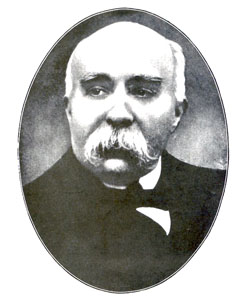
Source: An Alphabet of Heroes (1919)
As premier, Clemenceau immediately began a series of visits to the front to try and restore morale among the troops--he knew that the American presence would make a big difference; France just had to hang on longer. He also tightened government control of the economy, press, production, etc. in an effort to fight a total war, "la guerre jusqu'au bout" (war until the end). At another time, he might have been called a dictator for his authoritarian, strong-armed tactics in regard to any criticism of the French government or the war effort, but France was almost at its end; so at the time it was just called restoring order and morale.
As the war neared a close, Clemenceau adopted a tactful approach to Woodrow Wilson and the Fourteen Points, even though he personally thought that many of Wilson's ideas were Utopian. France still needed American help to win the war and fashion a peace treaty with Germany. Besides, the territorial points of the Fourteen Points meant that Alsace-Lorraine would be returned to France.
Once the decision had been made to hold the peace conference in France, it was natural that Clemenceau should preside over it, since he was the French Premier, and he also knew French and English. He was also now over 80, a bit cranky and suffering from eczema (although I might not be exact about that).
At the peace conference, he acquiesced with Wilson's plan for a League of Nations and had numerous difficult and lengthy exchanges with Wilson and Lloyd George within the Council of Ten and then later, more privately, in the Big 4. For Clemenceau, the key was not necessarily the Treaty of Versailles, which he did not think adequately punished Germany for the war--Most French diplomats knew that in economic and demographic terms Germany would quickly recover to surpass France and threaten France again in the not-too-distant future. For Clemenceau then, the most important result of the peace conference was the Anglo-American agreement to guarantee France in a mutual security pact, which he had negotiated, in good faith, in exchange for not annexing the Rhineland. Unfortunately, for France the US backed out of the agreement.
In 1920, Clemenceau lost the presidential election because of his perceived leniency towards Germany in the Treaty of Versailles. That is a bit surprising given that the Germans hated Clemenceau for his vindictive attitude towards Germany. Indeed, the Americans had repeatedly tried to temper his attitude toward the Germans during the negotiations. Clemenceau went into retirement and continued to write books and his memoirs.
On 19 February 1919, Clemenceau was shot in an attempted assassination attempt by Emile Cottin, an anarchist, who fired multiple shots at him, but mostly missed.
Clemenceau est connu pour ses nombreux duels (douze au total).
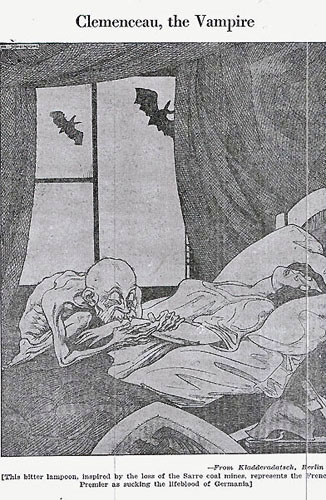
Source: Current History, July 1919
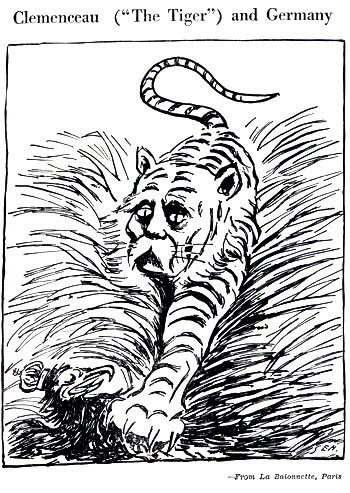
Source: Current History, May 1919
![]()
Some Websites (There are not many):
- Check the Wikipedia articles in English, French and German. The German is, not surprisingly, the shortest; the English one is the best.
- Musee Clemenceau does not really have much more to offer.
- First World War.com - Who's Who - Georges Clemenceau
- Clemenceau, the man and his time by Henry Mayers Hyndman (1919)
- Clemenceau was a prolific writer, and there is a long list of his own books/memoirs, including these two available online: The Strongest (Les plus fort) by Georges Clemenceau (1919) and The Surprises of Life by Georges Clemenceau (1920).
- There were many cartoons depicting Clemenceau. As a public figure for so long, Clemenceau was the target of a lot of political satire.
- He was also the source of many famous quotes.
- As for some primary sources documents, you can read
- La colonisation est-elle un devoir de civilisation? Discours à la Chambre des députés: 31 juillet 1885
- Clemenceau's Opening Address at the Paris Peace Conference, 18 January 1919
- Clemenceau Calls France to Arms in 1914.
